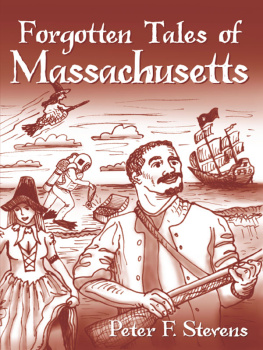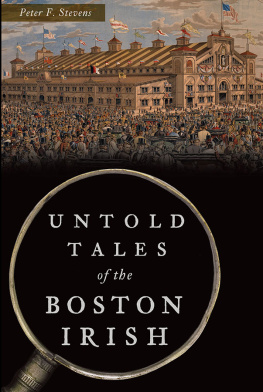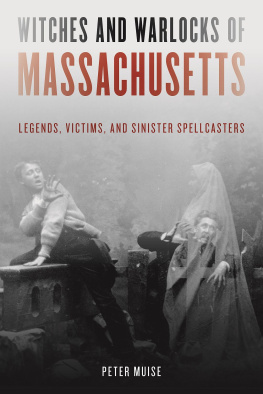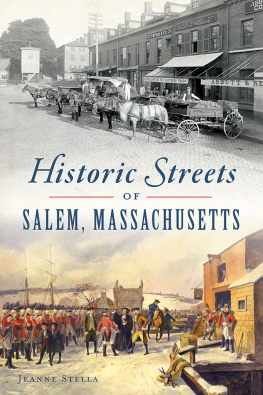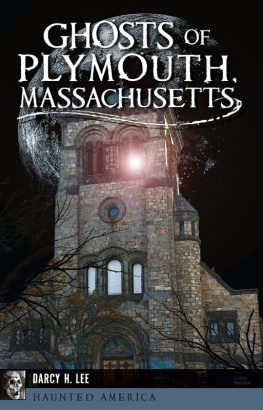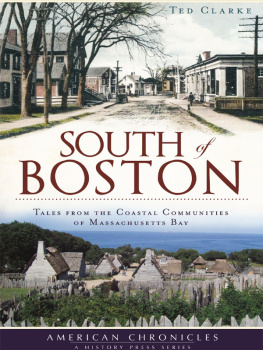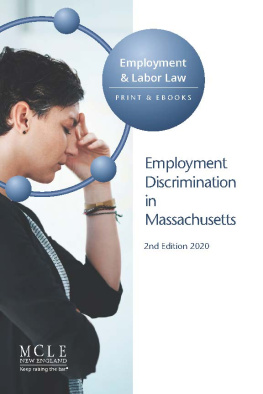
Published by The History Press
Charleston, SC 29403
www.historypress.net
Copyright 2009 by Peter F. Stevens
All rights reserved
Cover art and internal illustrations by Marshall Hudson.
First published 2009
e-book edition 2012
ISBN 978.1.61423.639.9
Library of Congress Cataloging-in-Publication Data
Stevens, Peter F.
Forgotten tales of Massachusetts / Peter Stevens.
p. cm.
print edition ISBN 978-1-59629-621-3
1. Massachusetts--History--Anecdotes. 2. Tales--Massachusetts. 3. Folklore--Massachusetts. I. Title.
F64.6.S747 2009
398.209744--dc22
2008052946
Notice: The information in this book is true and complete to the best of our knowledge. It is offered without guarantee on the part of the author or The History Press. The author and The History Press disclaim all liability in connection with the use of this book.
All rights reserved. No part of this book may be reproduced or transmitted in any form whatsoever without prior written permission from the publisher except in the case of brief quotations embodied in critical articles and reviews.

BIG BAD JOHN BILLINGTON: THE KILLER PILGRIM
In the woods near Plymouth, a matchlock musket roared. A hunters quarry crumpled to the forest floor. But the prey was not some wild turkey or other woodland animal. John Newcomen was on the ground, blood streaming from one of his shoulders. Another man disappeared into the forest with his smoking musket. His name was John Billington, and he was soon to become the first man convicted and executed for murder in the Thirteen Colonies.
From the moment in 1620 that a thirty-year-old Londoner named John Billington, who probably came from Lincolnshire, led his wife Elinor and their two young boys onto the Mayflower for the impending voyage to the New World, trouble traveled with the other passengers. John Billington, a tough, foulmouthed miscreant, was to bring his own brand of strife to the settlement on the edge of the wilderness.
How Billington wangled his way onto the Mayflower is lost in historys murk, but from the onset of the vessels legendary voyage, Pilgrim leader William Bradford grasped that Billington and his brood did not fit in with most of the other passengers. They [the Billingtons] were an ill-conditioned lot and unfit for the company, Bradford later wrote. He contemptuously labeled them one of the profanest families among them [the Pilgrims] and did not know how they had slipped aboard the ship. By the time the Pilgrims, ravaged by scurvy and the other travails of the perilous Atlantic crossing, first saw the shores of Cape Cod, Billington had made, among his shipboard enemies, a formidable foe in a hard-nosed soldier named Myles Standish.
Aboard the vessel, the Pilgrim men assembled to sign a landmark American document, the Mayflower Compact. Each signer promised to work for ye generall good of ye Colonie, unto which we promise all due submission and obedience. Men such as William Bradford, William Brewster, John Alden and Myles Standish meant to live by the lofty words of the pact, but the twenty-sixth of the forty-one signers had little intention of obeying anyone. Bradford later branded that twenty-sixth signerJohn Billingtona knave and so will live and die. These words were to ring with chilling, portentous truth.
Billington, as did all the settlers, spent his first months in Plymouth battling for survival against starvation, disease and the harsh New England winter of 162021. He and his family enduredto bedevil their neighbors.
As springs thaw warmed the bodies and souls of the Pilgrims who had survived their first nightmarish winter in the New World, Billingtons bullying began again, coupled with a streak of independence he manifested to lead his life as he, not his neighbors, saw fit. But by refusing to honor a summons for military duty, a critical civic obligation for all able-bodied men in a colony worried, with reason or not, that Indians could swoop down upon the settlers thatched huts at any moment, Billington incensed even neighbors previously willing to overlook his cursing and his quarreling. The Pilgrims could not let his latest defiance go unpunished.
Billington was sentenced to be bound by his neck and heels, an excruciating punishment designed to make every muscle burn in agony. On April 4, 1621, Standish, undoubtedly eager to settle accounts with the bully, and several other men began binding Billington. Proving that he could mete out punishment to others but could not abide it himself, Billington bellowed for mercy to the magistrates, headed by Governor John Carter. Humbling himself and craving pardon, Billington convinced his neighbors to untie him; they must have hoped that his close brush with punishment had cowed him into obedience. They might as well have wished that New Englands chill winters would grow balmy.
Throughout the 1620s, John Billington ranted and railed against several of his neighbors, adding to his reputation as the black sheep of the village; however, for the settlement, every able-bodied man was an asset. The Pilgrims tolerated their bad neighbor, who was a skilled hunter and a man who could handle himself in a fight against Native Americans if the need arose.
In 1630, even Billingtons many detractors must have felt a twinge of pity for him. His son John Jr. died, carried off by gangrene, an often mortal ailment in an era when anti-infectants were few. Billington, in the wake of his sons death, clashed with a new settler named John Newcomen. Either a fearless soul or unaware of Billingtons reputation, Newcomen raised the bullys temper to a feverish pitch. Scholar Gleason L. Archer surmises that a quarrel started over a dispute about hunting, Newcomen perhaps straying into a woodland spot that Billington considered his own.
On a summer day in 1630, Newcomen strode into the woods outside of Plymouth. A musket shot suddenly pealed in the sultry air. A ball tore into Newcomens shoulder and he crumpled to the ground. The shooter slipped away in a haze of gunpowder smoke.
Pilgrims heard the shot and raced into the woods near the village. They found Newcomen still alive and able to identify his attackerJohn Billington. Several men with their muskets in hand scoured the woods for several days. However, Billington eluded them along the Indian paths and thickets that he knew like the proverbial back of his hand.
Unaware that his prey was still breathing, Billington strode back to town after a few days. His neighbors grabbed him, subdued him and hauled him to the lockup, which was perched on a rise above the plantations cottages and fields. Meanwhile, the vigil over the grievously wounded Newcomen continued. Newcomen finally succumbed to his wound. Billington now faced a murder trial and a fight to save his own life.
The murder trial, the first such proceeding in American history, unfolded inside Plymouths sturdy wooden meetinghouse. Jurors, with Newcomens eyewitness account, quickly reached their verdict: guilty by plain and notorious evidence. Pilgrim Governor William Bradford wrote: His [Billingtons] fact was that he waylaid a young man, one John Newcomen, about a former quarrel and shot him with a gun whereof he [Newcomen] died. John Billington was sentenced to hang.
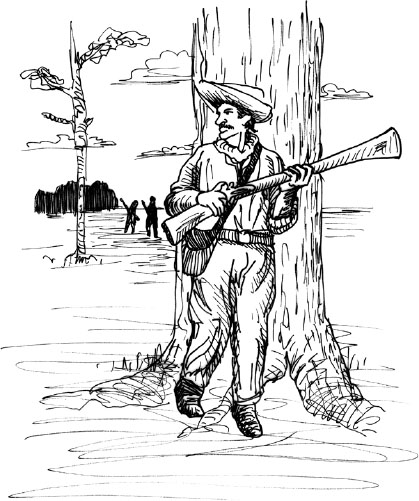
Although Billingtons guilt was obvious, Bradford and the plantations other leaders worried that they needed official approval from another legal body to carry out the death sentence. In later years, several historians would contend that Billington himself raised the legal dilemma by challenging his neighbors authority to hang him.
Next page
